January 2024, Volume 35, Issue 1
Gulf States and Sharp Power: Allies to Adversaries
The UAE, Saudi Arabia, and Qatar are spreading their influence across borders. A new dangerous chapter between the Gulf monarchies and the West has begun.
January 2024, Volume 35, Issue 1
The UAE, Saudi Arabia, and Qatar are spreading their influence across borders. A new dangerous chapter between the Gulf monarchies and the West has begun.
October 2023, Volume 34, Issue 4
A review of Beijing Rules: How China Weaponized Its Economy to Confront the World, by Bethany Allen.
April 2023, Volume 34, Issue 2
The staggering global popularity of soccer makes it a prime target for regimes that worry about the negative press they get for their undemocratic practices. The Gulf monarchies have led the way in getting into the wide world of sports as a means of cleaning their image.
April 2023, Volume 34, Issue 2
A review of Beijing’s Global Media Offensive: China’s Uneven Campaign to Influence Asia and the World by Joshua Kurlantzick.
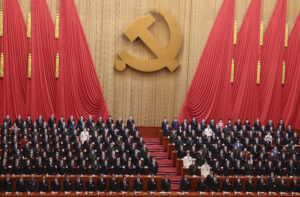

January 2023, Volume 34, Issue 1
The Chinese Communist Party is deadly serious about its authoritarian designs, and it is bent on promoting them. It is time for the world’s democracies to get serious, too.

October 2022, Volume 33, Issue 4
While a handful of democracies have responded effectively to this corrosive form of authoritarian influence, most societies are dangerously underequipped. New strategies are urgently needed.
July 2022, Volume 33, Issue 3
The more determined democracies are to avoid war, the greater the risk that autocracies will wage it.
July 2022, Volume 33, Issue 3
Influence operations by the People’s Republic of China and its “united front” organs were exposed years ago, but civil society and Chinese-Australians were first in understanding how to counter them.
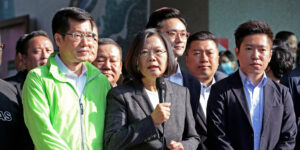
July 2022, Volume 33, Issue 3
No state on the planet is more heavily targeted by authoritarians’ information warfare than the Republic of China on Taiwan. And no other state and free society are better at resisting the daily onslaught.
July 2022, Volume 33, Issue 3
Any open society’s best weapon against Chinese influence operations is its openness—the ability to investigate and expose sharp-power manipulations, diminishing their strength.
April 2022, Volume 33, Issue 2
In 2021, autocrats’ efforts to reshape the global order enabled heavier repression and brazen power grabs, while democracies faltered. Is this a tipping point?
April 2022, Volume 33, Issue 2
The same technologies that are making traffic flow faster, cities run better, and ad-targeting more precise are also helping authoritarian governments to crush protests, hunt dissidents, and control their populations.
April 2022, Volume 33, Issue 2
China’s ability to shape the global entertainment industry extends well beyond films, and it no longer rests solely on the allure of big markets. Beijing is exerting newfound leverage that is making giant U.S. media companies do its bidding.
January 2022, Volume 33, Issue 1
China is expanding its global media footprint, aggressively peddling its preferred narratives and stifling criticism of its policies, all the while undermining free expression, public debate, and electoral integrity in more open societies.
January 2022, Volume 33, Issue 1
Information is being weaponized against democracy. Democratic societies need new ways to keep media free, accurate, and authentic.
July 2021, Volume 32, Issue 3
Authoritarian propaganda and manipulation are leading democratic publics to see foreign autocracies as more powerful than they actually are.
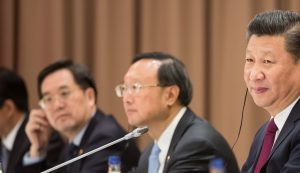

July 2021, Volume 32, Issue 3
Beijing is using red tape, procedural rules, and a little help from its authoritarian allies to strangle NGOs seeking to participate in the world body.
April 2021, Volume 32, Issue 2
The year 2020 saw the global weakening of democratic norms reinforced by authoritarian influence campaigns, crackdowns on protest movements, and the use and abuse of new powers adopted in the name of responding to the covid-19 pandemic.
October 2020, Volume 31, Issue 4
Universities, publishers, and other knowledge-sector institutions face increasingly sophisticated authoritarian efforts to quash critics and subvert independent inquiry.
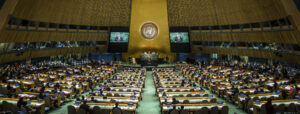

October 2020, Volume 31, Issue 4
Through greater savvy engagement with international law, authoritarians are seeking not only to shield themselves from criticism, but to reshape global norms in their favor.
October 2020, Volume 31, Issue 4
The People’s Republic of China uses massive amounts of propaganda to influence how it is perceived beyond its borders. “Big data” reveal how that image is carefully and deliberately shaped for different audiences in different places.
October 2020, Volume 31, Issue 4
A review of Hidden Hand: Exposing How the Chinese Communist Party Is Reshaping the World, by Clive Hamilton and Mareike Ohlberg.
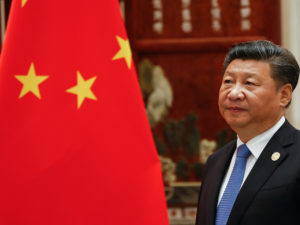

July 2020, Volume 31, Issue 3
President Xi Jinping and the Chinese Communist Party are taking advantage of the coronavirus pandemic to seize new ground and promote China’s global influence. But their assertive, strong-arm tactics are born from fear and restless insecurity.
July 2020, Volume 31, Issue 3
No country in the world is more intensely targeted by Beijing’s influence operations than Taiwan. The lead-up to the January 2020 elections saw China putting a full-court press on the island, but Taiwanese democracy broke it.
July 2020, Volume 31, Issue 3
The illiberal credo prominent in Russia’s foreign policy is more than just a clever political ploy. Rather, this outlook reflects the traumatic experience of the 1990s, and it is stoked by young political thinkers, the Russian Orthodox Church, and the Kremlin itself.
April 2020, Volume 31, Issue 2
In 2019, the global democratic recession deepened, while protest movements proliferated around the world, fighting largely without leaders or support from major democracies.
January 2020, Volume 31, Issue 1
Democratic societies must address the spread of technology developed in authoritarian settings while continuing to uphold democratic norms.
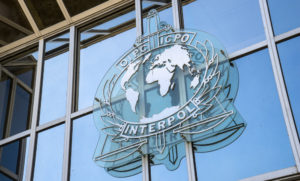

April 2019, Volume 30, Issue 2
Globalized authoritarian regimes are increasingly abusing Interpol’s notice system to go after political opponents based abroad. These regimes seek not only to punish their critics, but also to legitimate their own acts of repression.
January 2019, Volume 30, Issue 1
Democracies must grapple not only with the proliferation of AI to authoritarian and illiberal regimes, but also with the temptation that AI poses for democratic governments themselves.


January 2019, Volume 30, Issue 1
Chinese authorities are wielding facial-recognition software, big-data analytics, and other digital technologies to control China’s citizens by monitoring and assessing their activities, both online and off.

October 2018, Volume 29, Issue 4
Taking advantage of broad global respect for regionalism, authoritarian regimes are using their own regional organizations to bolster fellow autocracies. These groupings offer a mechanism for lending legitimacy, redistributing resources, and insulating members from democratic influences.
July 2018, Volume 29, Issue 3
Today’s authoritarians are using “sharp power” to project their influence internationally, with the objective of limiting free expression, spreading confusion, and distorting the political environment within democracies.
April 2018, Volume 29, Issue 2
China has emerged as a key player in development assistance, challenging the mainstream development community’s emphasis on good governance.
April 2018, Volume 29, Issue 2
Australia has been an early target of China’s efforts to buy influence and suppress critical voices, but it has begun mounting a serious defense.
April 2018, Volume 29, Issue 2
The Chinese Communist Party has been using New Zealand as a testing ground for its strategy of building influence through “united front work.”
April 2018, Volume 29, Issue 2
Despite its tiny size, Singapore has shown that a firm stance can help to resist Chinese encroachment.
April 2018, Volume 29, Issue 2
Through its “16+1” initiative, China is building relationships with postcommunist Europe that could threaten to undermine the European Union.
April 2018, Volume 29, Issue 2
In 2017, the state of political rights and civil liberties around the world sunk to its lowest point in more than a decade. While the democratic powers grappled with their own internal problems, leading autocrats expanded their global efforts to undermine democratic institutions.
October 2017, Volume 28, Issue 4
A review of China’s Eurasian Century? Political and Strategic Implications of the Belt and Road Initiative by Nadège Rolland.
January 2016, Volume 27, Issue 1
Although the leading authoritarian regimes are today integrated in many ways into the global system, they have not become more like the democracies; instead, they have been devising policies and practices aimed at blocking democracy’s advance.
January 2016, Volume 27, Issue 1
While “autocracy promotion” presents a real danger, its influence so far has been limited. Because authoritarian regimes are concerned first with furthering their own interests, their interventions often have contradictory effects, sometimes even inadvertently fostering greater pluralism.

October 2015, Volume 26, Issue 4
East European communists inherited the Bolshevik obsession with repressing any genuinely independent civil society groups.
October 2015, Volume 26, Issue 4
Once widely celebrated, civil society today is regarded as a threat by many governments, leading them to restrict its funding and activities.
October 2015, Volume 26, Issue 4
The Kremlin is now bringing to the rest of the world the kind of propaganda and conspiracy theories it has been churning out at home.
October 2015, Volume 26, Issue 4
China is aggressively working to reshape its image, touting the “Chinese Dream” and its desire for a peaceful rise to power on the international stage.

July 2015, Volume 26, Issue 3
Favored by global conditions that lean their way, authoritarians have been busy over the last decade coming up with new and inventive ways to thwart the global advance of democracy and human rights.
July 2015, Volume 26, Issue 3
Rosy assumptions once held that the Internet would inevitably undermine unfree regimes. A look around the world today, however, indicates that something very different and far more disturbing is going on.
July 2015, Volume 26, Issue 3
Nonpartisan election monitoring has helped to foster democratization over the last thirty years, but now dictators are trying to sabotage it, often by spreading lies and confusion.

April 2015, Volume 26, Issue 2
Even if Vladimir Putin were to lose his grip on office, the “Russian system” might only wind up exchanging one form of personalized power for another in its endless search for self-perpetuation.
April 2015, Volume 26, Issue 2
The Iranian regime has sought to recast conventional principles of human rights and political participation by forging alliances with like-minded regimes and by broadcasting its narrative to an international audience.
April 2015, Volume 26, Issue 2
Saudi Arabia’s vast oil wealth sustains the antidemocratic policies that a nervous royal regime uses to defend against the threats and problems that confront it.
July 2014, Volume 25, Issue 3
The regime of Vladimir Putin has been a key driver of the crisis in Ukraine. Under challenge at home for several years now, it turned to Ukraine in part to firm up its own grip on power in Russia.
October 2001, Volume 12, Issue 4
Hong Kong has experienced a smooth transition from British to Chinese rule, but signs of political, economic, and social malaise mean that further steps toward fuller democracy are needed.
October 2001, Volume 12, Issue 4
Ukraine has secured its independence, but remains troubled by slow growth, corruption, and an overly strong presidency.
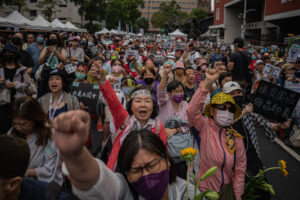
Beijing assaults Taiwan with a nonstop barrage of conspiracy theories and lies to undermine people’s faith in democracy — and China’s efforts are getting more sophisticated. Taiwan must do even more to fight back.
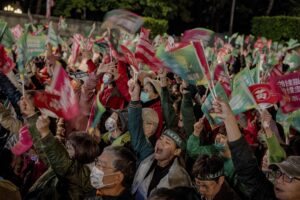
Millions of voters are casting ballots in a string of elections across the globe. At the midyear point, how well is democracy holding up?

Taiwan’s voters rewarded the ruling party with an unprecedented third consecutive term, despite the mainland’s attempts to intimidate. Expect Beijing to find new ways to threaten the democracy off its coast.
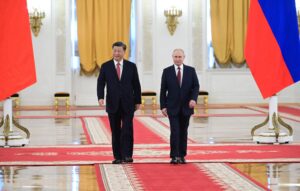
They are benefiting from a world that has grown more hostile for democracy and human rights. But it doesn’t need to be the case. Democracies need to double down on their own competitive advantage.

Moscow and China pose a great danger to the democratic world. But they pose threats that need to be managed, not won. Every great foreign-policy battle doesn’t end with a decisive victory.
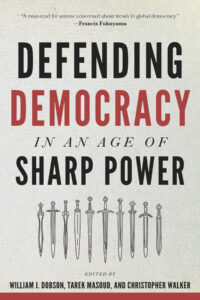
Explores how authoritarian regimes are deploying “sharp power” to undermine democracies from within by weaponizing universities, institutions, media, technology, and entertainment industries.

The government has spent billions preparing to host the 2022 World Cup. Never mind the abusive labor practices and human rights violations. It’s betting that your love of the “beautiful game” will make you more fond of this tiny Gulf state, too.

The popular Chinese-owned app is enabling Beijing to collect data on people nearly everywhere. Not only can such platforms track people’s preferences and whereabouts, but they give the Chinese government control over a powerful tool for shaping people’s worldview.